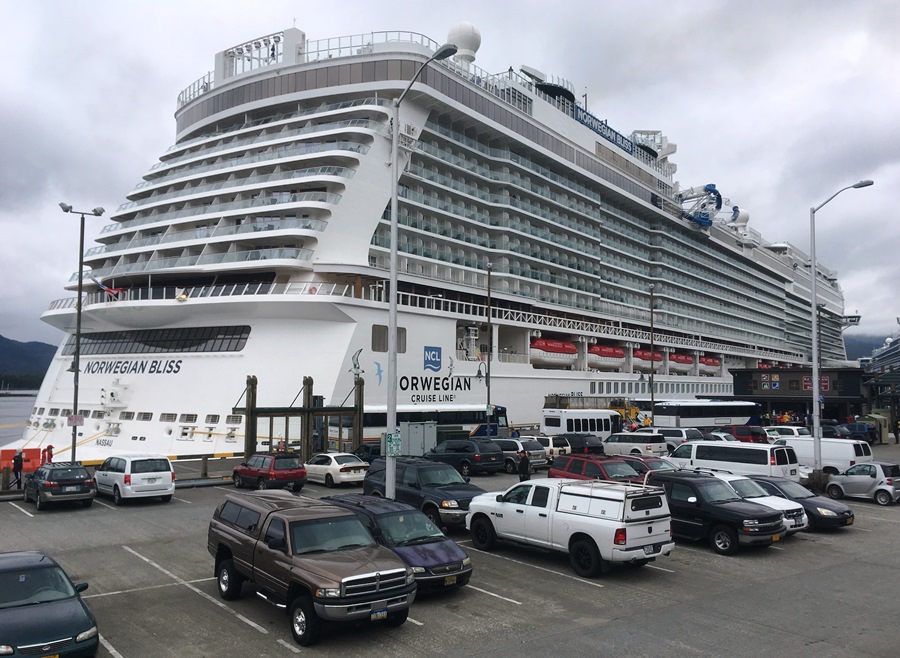
Legislation providing $2 trillion in relief for individuals and businesses hard hit by the coronavirus pandemic has been approved by the U.S. Senate. President Donald Trump has repeatedly said the cruise industry is among those he’d like to help.
“We can’t let the cruise line lines go out of business,” the president said last Sunday. “I mean, that would be massive numbers of jobs for our country.”
An industry trade group Cruise Lines International Association says its industry helps support more than 421,000 American jobs and contributes $53 billion to the U.S. economy. That’s threatened in Alaska and nationally following the global outbreak of COVID-19.
These economic figures include indirect economic benefits to smaller Alaska operators which are feeling the hit from a stalled cruise season.
“You’d be hard to find an operator in Alaska that’s not currently adapting schedules and figuring out plans to survive summer,” Colleen Stephens, who helps run a family owned boat tour operation in Valdez, told CoastAlaska.
She’s also president of the Passenger Vessel Association, the national trade association representing U.S.-flagged passenger ships. In Alaska, that’s everything from private whale watching tour boats to the Alaska Marine Highway System.
The PVA recently penned a letter to the White House highlighting the “economic damage” being inflicted on its members by the coronavirus pandemic.
“The message we wanted to put forward is, ‘to remember us,'” she said. “We are providing U.S. jobs, we are providing taxes into the U.S. economy and local economies. And as we feel the hit which — we are all feeling very drastically — we wanted the message to be there to remember your U.S. domestic operators.”
A major union representing U.S. crew members is against any public money flowing to the cruise lines.
“We’ve heard discussions about a cruise industry bailout and it just, I can’t tell you how inappropriate and outrageous It really is — when you start thinking about it,” Don Marcus, president of The International Organization of Masters, Mates & Pilots.
He says domestic, U.S.-flagged vessel operators should be first in line, not cruise lines that flag their ships in foreign countries to avoid paying taxes.
“My concern is it would be an outrageous misappropriation of, of tax dollars to bail out international cruise ship companies that are U.S.-owned that don’t pay taxes,” Marcus said in an interview. “When you have ferries, marine transportation industry around the country that are going to be in a similar position.”
Alaska’s U.S. senators haven’t said directly whether they support aid to the cruise lines.
“Senator Sullivan is focused on lessening the impacts of the coronavirus pandemic to Alaska’s working men and women, and many businesses throughout the state, including our tourism businesses — many of which are dependent on the cruise industry,” spokesman Mike Anderson wrote in a statement.
“Senator Murkowski is working with her colleagues to mitigate the impacts of this pandemic on Alaskans, small businesses, non-profits, and industries,” spokeswoman Karina Borger wrote.
The Senate bill establishes a nearly $500 billion fund for struggling industries, though it doesn’t specify exactly how the money will be doled out. That will come later.
A Washington, D.C. watchdog group that’s tracking the recipients of the stimulus package, says the big cruise lines like Carnival, Norwegian and Royal Caribbean shouldn’t be allowed to tap into this money.
“The cruise industry has been abusing the US taxpayer for years — for decades,” said Steve Ellis, president of Taxpayers for Common Sense in an interview.
He says COVID-19 took a lot of people by surprise. But big players can’t pretend like they didn’t see a potential pandemic as possible, “particularly in the cruise industry that has had problems in the past with viruses and other illnesses and sick ship syndromes.”






